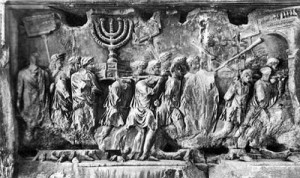Thoughts on Today’s Lessons for Sunday, Nov. 17, 2013.
Nearing the end of Isaiah’s account of the people’s loss of Jerusalem and the temple, their exile and eventual return, in this reading the prophet celebrates God’s plan for the new Jerusalem as a joy and a delight. A city with no weeping, no distress … no death in childbirth, no pain … joyous lives of 100 years of youthful strength! And, at the end, it is a holy place of peace, where the lion and the lamb rest together and none shall hurt or destroy.
Psalm: Isaiah 12:2-6 (Canticle 9 BCP)
These verses from earlier in Isaiah, read as our Psalm today, are familiar to Episcopalians as Canticle 9 in Morning Prayer. The prophet, foreseeing the destruction of the Temple, nevertheless declares God our stronghold and our sure defense, who can be trusted to save us even in threatening times when we feel frightened and vulnerable.
Second Reading: 2 Thessalonians 2:1-5, 13-17
“Anyone unwilling to work should not eat.” Too often we hear this harsh judgment echoed in modern times. In context, this letter, written in Paul’s name in a time of Roman persecution, calls members of a specific church community to pull their fair weight in a battle against an immediate challenge. Nowadays, however, it’s best not to judge, but to humbly heed Jesus’s urgent words in Matthew 23: “Just as you did it to the least of these, you did it to me.”
Gospel: Luke 21:5-19
Here’s context for this scary forecast of war and destruction: The evangelist we know as Luke wrote this Gospel to a primarily Gentile audience some 70 years after the Crucifixion and 30 years after the Romans destroyed Jerusalem and the Temple. He is telling a known story in the form of a lesson from Jesus, bearing a truth that works as well for us as for Christians in Luke’s own time of persecution: God is with us. Even when we’re betrayed, scorned, hated and hurt, “By our endurance we will gain our souls.”

